BBQ and smoking both have their loyal fan bases. We’re here to dig into why. Each method cooks meat to perfection, yet they couldn’t be more different. BBQ means grilling—fast and hot. Smoking? Slow, oh so slow, and at low temperatures.
We’ve all been at a BBQ, sauce on our faces, smiles as wide as the plates. Then there’s the smoking crowd, checking their watches, talking about patience and flavor. Both methods have their secrets.
We’re not picking sides. We’re sharing experiences. Our backyard experiments have led to some epic fails and surprising successes.
What’s better? You decide. But first, let’s talk facts, flavors, and why patience might just be your new best friend at the grill.
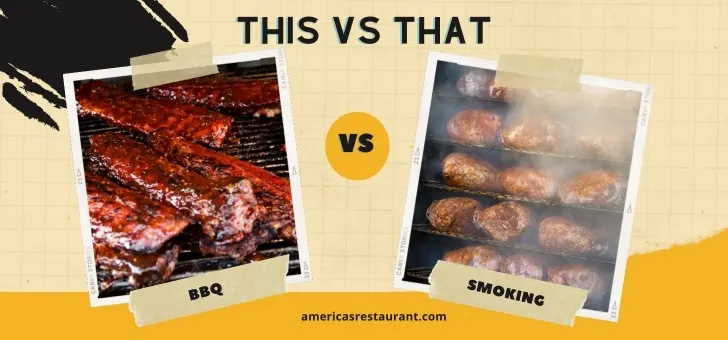
What is BBQ?
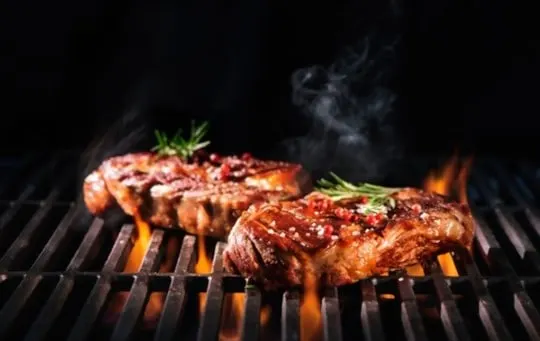
Barbecue, or BBQ, is a cooking technique that involves slow-cooking meat over an open flame.
The meat can be marinated with different spices and sauces before being placed on the grill.
The heat source could be charcoal, wood, propane or natural gas depending on personal preference and location.
BBQ enthusiasts have perfected this art by carefully controlling temperature and time to create mouthwatering flavors and textures that can vary greatly depending on the type of wood used for smoking, marinade, and cut of meat.
If you are planning to cook something quickly for a hungry bunch of friends, then BBQ might be your choice as it’s a quicker process compared to smoking which might not provide ready-to-eat food in sufficient quantity until much later.
Smoking is more effective when the focus is on developing complex flavors while preserving the moisture in large cuts of meat.
What is Smoking?
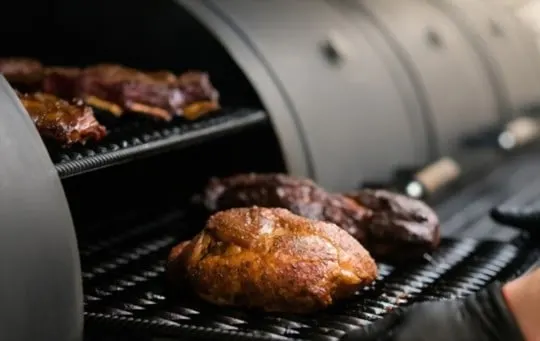
Smoking of meat involves slow-cooking the meat over low heat for long hours until it’s tender and flavorful.
The process usually involves adding smoke to enhance the flavor of the meat.
Smoking infuses rich, smoky flavors into the food, making it a popular choice for barbecue enthusiasts worldwide.
Smoking can be done using different types of wood with different flavors specific to each type.
For instance, hardwoods like oak, hickory, and mesquite are known for their bold flavor and aroma.
Fruitwood like applewood and cherrywood impart a sweeter taste to the meat.
The smoking process also helps preserve meat since cooking temperatures typically range between 165-225°F, which kills bacteria and other harmful pathogens; this makes it safe for consumption.
Additionally, smoking is also an excellent option for those looking to reduce fat content in their meats since fats tend to drip off during the cooking process.
Differences Between BBQ and Smoking
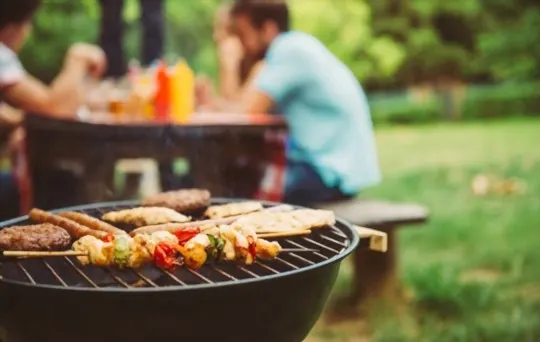
When it comes to preparing food, there are various techniques that can be used.
Among them are BBQ and smoking.
Both methods add a distinctive flavour to the dish, but they have different processes of cooking.
Generally, BBQ involves cooking meat on open flames or hot coals.
This method relies on high heat and is best suited for quick grilling or searing.
On the other hand, smoking slow-cooks food using low temperatures and smoke infusion, resulting in tender meat with rich aroma and flavour.
One significant difference between the two methods is their cooking duration.
As mentioned, grilling takes less time than smoking because it requires higher heat levels.
Additionally, when grilling with charcoal or wood chips, one must keep a careful eye as the meat could quickly overcook or burn.
Another difference is the type of fuel used.
While both involve burning wood materials for cooking, BBQ mostly utilizes charcoal briquettes which generate more intense flames that provide better searing capabilities as compared to those of regular cooking fuels.
Hence, whether BBQ or smoking is ideal depends on various factors such as food preferences and timescales allocated for meat preparations.
The final taste largely depends on how well-prepared the meal is and personal taste choices of spices and seasoning blends used by the individual cook.
Cooking Method
When it comes to cooking food, there are various methods available to choose from.
Barbecue and Smoking are popular cooking techniques that people often prefer, but which one is better? BBQ involves grilling meat over open flames while smoking refers to the slow-cooking process of meat using smoke as a flavoring agent.
Both cooking methods have their benefits and drawbacks worth considering.
In terms of flavor, smoking provides a unique taste due to the use of wood chips or chunks that infuse flavors into the meat.
Smoked meats are usually juicy, tender, and infused with smoky flavors that cannot be matched by simple grilling.
On the other hand, barbequed meats are often charred on the outside with slightly less smoky flavors compared to smoked meats.
Another factor worth considering is time.
Smoking involves long periods of low-temperature cooking that requires patience and dedication to let the meat cook slowly until it’s ready.
BBQ takes less time than smoking because it involves high temperature, direct heat exposure for finishing touches right before serving.
When it comes down to choosing between BBQ and Smoking, it depends on personal preference and taste.
While both techniques have unique advantages in terms of flavor and preparation time, individuals need to consider factors such as convenience, budget, type of meat being cooked before deciding what works best for them.
Heat Source
The type of heat source used in BBQ or smoking affects the taste and texture of the food.
When BBQing, charcoal or gas grills are commonly used while smokers rely on wood chips to flavor the meat.
The choice of heat source can affect cooking time, temperature control, and overall outcome.
In BBQ methods, the heat is directly beneath the food, whereas smoking requires indirect heat.
The fuel sources for these methods also play a crucial role in determining the smoky flavor profile of the food.
Time and Temperature
When it comes to BBQ vs smoking, the time and temperature play a crucial role in the end result.
The ideal temperature will vary depending on the type of meat being cooked and whether you are using a smoker or a grill.
A general rule is to cook at a low and slow temperature for smoking, while grilling requires higher heat for shorter periods.
Additionally, there are factors such as the humidity and wind that affect cooking times, so it’s essential to keep an eye on the food’s internal temperature rather than solely relying on time estimates.
Remember that patience is key when smoking, whereas grilling may require more attention due to the high heat and shorter cooking time.
Overall, understanding how these factors affect your cooking will help you achieve delicious results every time.
Flavor and Texture
When it comes to BBQ and smoking, the flavor and texture of the meat are what make them both stand out.
Smoking involves cooking meat using smoke from burning wood or charcoal, giving it a distinct smoky flavor.
The low-and-slow cooking process ensures that the meat remains tender and juicy while developing a crispy outer layer.
On the other hand, BBQ uses direct heat to cook meats over an open flame.
The result is a caramelized exterior crust with tender and moist meat beneath.
Both techniques bring their unique flavors to the table, providing distinctive sensations that awaken taste buds.
Some people prefer the sharp tangy taste of smoked meats as compared to the sweet glaze of BBQ ribs.
For some, there is no replacement for the signature smoky touch that smoking imparts on food.
While others enjoy biting into crispy skinned chicken coated in zesty barbecue sauce.
BBQ and smoking have become increasingly popular across cultures worldwide due to their stunning flavor profiles.
Whether you opt for savory beef brisket or succulent pork chops cooked over hardwood, each technique delivers its version of mouth-watering textures with every bite.
Similarities Between BBQ and Smoking
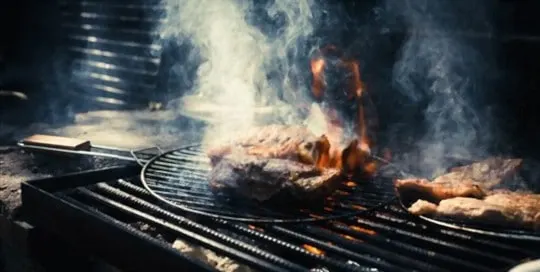
Both BBQ and smoking involve cooking food over low heat for an extended period of time, allowing for a tender and juicy final product.
Both methods require the use of wood, charcoal or pellets to produce smoke that infuses flavors into the meat.
Additionally, both BBQ and smoking are versatile cooking styles that can be used for various types of meat, including pork, beef, chicken or fish.
While there are similarities between BBQ and smoking, there are distinguishable differences as well.
BBQ usually involves higher temperatures than smoking and is often associated with grilling rather than slow-cooking.
Smoking typically cooks food at lower temperatures for a longer time period and is therefore ideal for tough cuts of meats that require breaking down the collagen in the muscle fibers to become tender.
It’s worth noting that both techniques have their own set of benefits and drawbacks.
Whether you prefer one method over the other may depend on your personal preferences or the type of dish you’re preparing.
Ultimately, experimentation with both techniques can reveal which method will give you the desired flavor profile for any given dish.
Factors to Consider in Choosing Between BBQ and Smoking
When deciding between BBQ and smoking, there are multiple factors to consider.
These may include the type of meat being cooked, cooking time, desired level of smokiness and the required equipment.
BBQ typically involves applying savory sauces and spices while grilling meats directly over high heat.
The result is a crispy exterior and moist interior with bold flavors.
Smoking, on the other hand, uses low heat for extended periods, allowing the meat to slowly absorb the smoke flavor.
Factors to keep in mind when selecting between BBQ vs smoking include personal taste preferences, available time for cooking, and the occasion or event one is preparing food for.
Moreover, it’s important to choose suitable equipment depending on your choice of method.
Type of Food
Different cooking methods can enhance the flavor and texture of various types of dishes, especially meat.
Grilling and smoking are two popular methods that create unique and distinct flavors, but which one is better?
Grilling over direct heat on a barbeque (BBQ) creates a crispy exterior with a smoky aroma, ideal for quick-cooking meats like burgers and hot dogs.
On the other hand, smoking meat means cooking it low and slow using indirect heat and wood smoke, perfect for tougher cuts like brisket or ribs.
While BBQ may be quicker, smoking takes more time to break down connective tissues, resulting in tender, juicy meat infused with a rich smoky flavor.
Additionally, smoking allows for added flavor through the use of different woods like oak or hickory.
Time Constraints
For those facing time limitations, grilling methods such as BBQ may seem like a quicker option compared to smoking.
However, this approach is not necessarily true as the type of meat and its cook temperature also play a crucial role in the process.
While grilling requires higher temperatures for faster cooking times, the meat could become dry and lose its flavor.
On the other hand, smoking involves cooking at relatively lower temperatures for longer durations which allows meat flavors to fully develop and stay moist throughout.
A convenient way to smoke is using an electric smoker that can regulate temperature precisely.
It’s also worth noting that some meats require longer smoking times than others, which means the overall cooking time may be more prolonged than when grilling.
However, investing in a good quality smoker can be an excellent decision in the long run for deliciously smoked meats with minimal effort.
Flavor Preferences
Each individual has a distinct taste preference when it comes to food.
This applies to barbecued and smoked meat as well.
The flavor of barbecued and smoked meat can differ depending on the technique used, cooking time, wood choices, and rubs or sauces applied.
When it comes to BBQ vs smoking, the key difference is the amount of smoke that touches the meat.
In smoking, there is low and slow cooking at an average temperature of 225°F with indirect heat from wooden chips generating smoke in a smoker.
This process results in a deep smoky taste that may not be suitable for everyone’s liking.
With Barbeque, cooking is done under direct heat using charcoal which allows for a caramelized crust outside with a softer interior.
For those who prefer intense smoky flavors in their ribs or brisket, smoking would be the way to go.
Whereas for those who want barbecue meat that’s juicy with a sweet spicy sauce covering the chunks, bbq would be more preferred.
In summary, personal preference plays a significant role in choosing between barbecue or smoking for your next cookout.
Understanding the pros and cons of each method can help you make an informed decision based on your taste preferences and culinary choices.
Popular BBQ and Smoking Techniques
BBQ and Smoking are two of the most popular cooking techniques used worldwide to imbue meat with a smoky flavor.
Both methods, while different in execution, produce meats that are flavorful and juicy.
In BBQ, meat is cooked over low heat using indirect heat for several hours.
Smoking, on the other hand, utilizes smoke generated from hardwoods or charcoal to cook the meat at low temperatures for an extended time.
Both methods have their benefits and drawbacks depending on one’s personal preference, budget, time availability and equipment.
When it comes to BBQ vs Smoking, it’s important to keep factors like flavor profile, convenience and cooking time in mind.
While blackened charbroiled marks might look scrumptious on a piece of grilled meat over propane-fueled gas grill flames (§1), there is something magical about slowly smoked brisket or ribs that have been seasoned with a rub either overnight or days ahead of time (§2).
The beauty of smoking lies in its ability to enhance the natural flavors of the food while imparting layers of smoky intensity in ways grilled foods cannot match (§2).
Something worth noting is that both techniques take longer than traditional grilling but offer distinctive tastes to dishes; therefore it’s not easy to determine which one is better than the other (§3).
Factors such as equipment availability and level of expertise may also influence which technique one prefers when cooking outdoors.
Ultimately, it’s up to personal preference whether you want a quick-grilled meal or a taste-bud tantalizing slow-cooked barbecue or smoking experience.
Conclusion
In the great debate of BBQ vs Smoking, the decision ultimately comes down to personal preference and desired flavor outcome.
Both methods have their advantages and disadvantages, but it ultimately depends on the end result you are striving for.
While some may argue that one method is superior to the other, it really comes down to what type of meat you are cooking and how you want it to taste.
For example, traditionally BBQ ribs may benefit from grilling for a perfectly crispy exterior while brisket or pulled pork may be better smoked for tender juiciness.
Ultimately, neither method reigns supreme as both can produce mouth-watering results when executed correctly.
The decision between BBQ and smoking ultimately lies in your own personal tastes and preferences.

Leave a comment